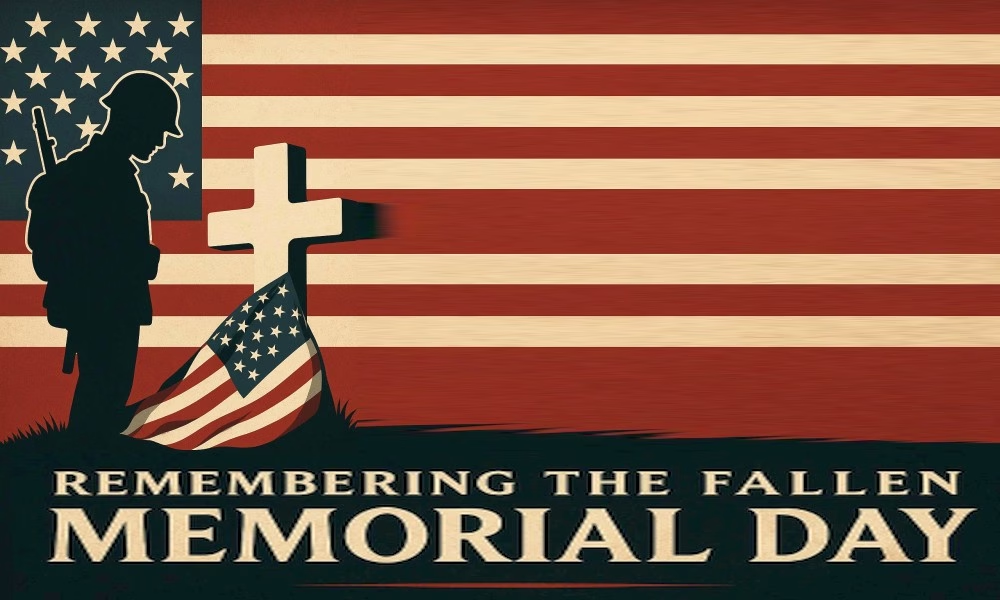
By LTC Mike Moad, U.S. Army Retired
Every year, on the last Monday of May, Americans pause to observe Memorial Day—a time of reflection, remembrance, and gratitude. It’s a holiday marked by parades, flag ceremonies, and backyard barbecues, but its deeper purpose lies in honoring the brave men and women of the U.S. military who died in service to their country. Memorial Day is not just a day off work or the unofficial start of summer—it’s a solemn and sacred time to remember the cost of freedom.
The History of Memorial Day
Originally known as ‘Decoration Day’, the holiday was established after the Civil War to honor the Union soldiers who had died. The first widely recognized observance took place on May 30, 1868, when General John A. Logan of the Grand Army of the Republic called for a nationwide day of remembrance. Americans decorated the graves of fallen soldiers with flowers, flags, and wreaths—hence the name Decoration Day.
Over time, the holiday evolved to honor American military personnel who died in all wars. In 1971, Congress declared Memorial Day a national holiday and officially moved it to the last Monday in May to create a three-day weekend.
Memorial Day vs. Veterans Day
It’s a common point of confusion, but Memorial Day and Veterans Day are not the same.
Memorial Day honors service members who died in the line of duty. It’s a time of mourning and respect for those who gave their lives for our nation.
Veterans Day, celebrated on November 11th, recognizes all who served in the U.S. Armed Forces, living or deceased, with an emphasis on honoring living veterans for their service.
Both holidays are deeply meaningful, but Memorial Day carries a particular gravity—it’s not about thanking veterans who are still with us, but rather remembering those who aren’t.
What to Say on Memorial Day
It can be tricky to know what to say to a veteran or someone who has lost a loved one in service. Saying “Happy Memorial Day” might feel upbeat, but it can be a little out of step with the day’s tone. Instead, consider:
* “Thank you for remembering.”
* “I’m thinking of those who gave everything.”
* “We honor their sacrifice.”
* “May their memory be a blessing.”
If speaking to a Gold Star family—relatives of someone who died in military service—a simple acknowledgment of their loved one’s service and your gratitude is often enough. Kindness and sincerity always matter most.
Veteran Cemeteries and National Memorials
Across the country, veterans’ cemeteries become places of pilgrimage on Memorial Day. Small American flags are placed at each headstone in a striking visual display of honor and gratitude. The most iconic of these sites is Arlington National Cemetery in Virginia, where over 400,000 veterans, including the Tomb of the Unknown Soldier, are laid to rest.
Other notable memorial cemeteries include:
* Fort Sam Houston National Cemetery in San Antonio, Texas
* Gettysburg National Cemetery in Pennsylvania
* Punchbowl National Cemetery in Hawaii
* Dallas–Fort Worth National Cemetery, a prominent Texas site with more than 73,000 interments
These cemeteries are not just burial grounds—they are hallowed spaces where the stories of America’s heroes are etched into marble and memory.
How Americans Celebrate
Despite the somber origins, Memorial Day is also a celebration of American life and liberty—what our fallen fought to preserve. Across the country, people attend parades, visit cemeteries and memorials, or observe a moment of silence at 3:00 p.m. local time, known as the National Moment of Remembrance.
Cities and towns host ceremonies and dedications. Churches hold special services. Families gather for cookouts, waving flags and reflecting on the sacrifices that made their freedoms possible. Sporting events often begin with patriotic tributes, and many communities raise funds or awareness for veterans’ charities.
A Day of Meaning
Ultimately, Memorial Day is about more than a three-day weekend. It’s about recognizing the price of freedom and making sure that the stories and names of those who gave their lives are not forgotten.
So whether you’re placing a flag on a grave, attending a local ceremony, or simply reflecting with your family over dinner, take a moment to honor our fallen heroes. Because remembering them is not just the purpose of Memorial Day—it is the responsibility of every American.





Rob Connelly
May 20, 2025 at 2:52 pmThank you for your service Sir. And thank you for the reminder of what Memorial Day represents 👍🙏🏻🇺🇸
Sincerely,
Rob